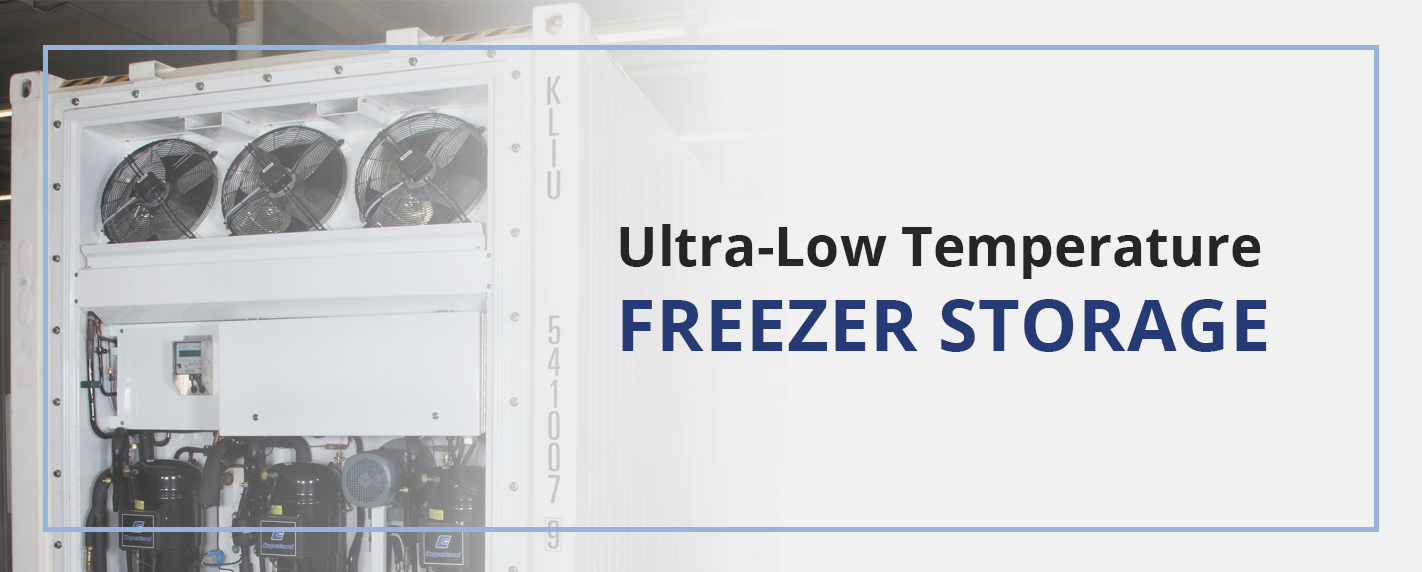
If you work in the cold chain market, you understand the importance of temperature control. Whether you work in the pharmaceutical industry or seafood and meat processing, you are likely familiar with refrigerated and freezer containers for safe product transport. However, did you ever consider adding an ultra-low temperature freezer to your facility or store for storage purposes?
A backup freezer storage container helps companies control the quality of their frozen products and prepare for the unexpected. With the global frozen food market projected to continue growing through 2024, cold chain companies can’t afford to put products at risk if they want to keep up with the competition and consumer demand.
It’s not just the frozen foods market that’s growing around the world. Certain vaccines require freezer storage, and the global vaccine market is projected to rise to $100 billion by 2025. There’s a demand for effective pharmaceutical products around the globe, and proper storage ensures these products are safe and useable.
To meet the global demand for frozen products, companies can benefit from boosting efficiency. Part of running an efficient operation is being prepared for the unexpected at all times. Klinge Corporation’s Dual System Deep Freezer Container, Model NMF-372 can help your company overcome hurdles when you need freezer storage fast. Our NMF-372 can also keep products optimally frozen while you wait for shipping or distribution. With the NMF-372, you can expect an ultra-low freezer temperature range of 0°C to -70°C.
Let’s explore the benefits of using an ultra-low temperature freezer for storage, common applications and why they make a great option for backup storage in the event of downtime or cold room storage repairs.
Common Applications of an Ultra-Low Temperature Storage System
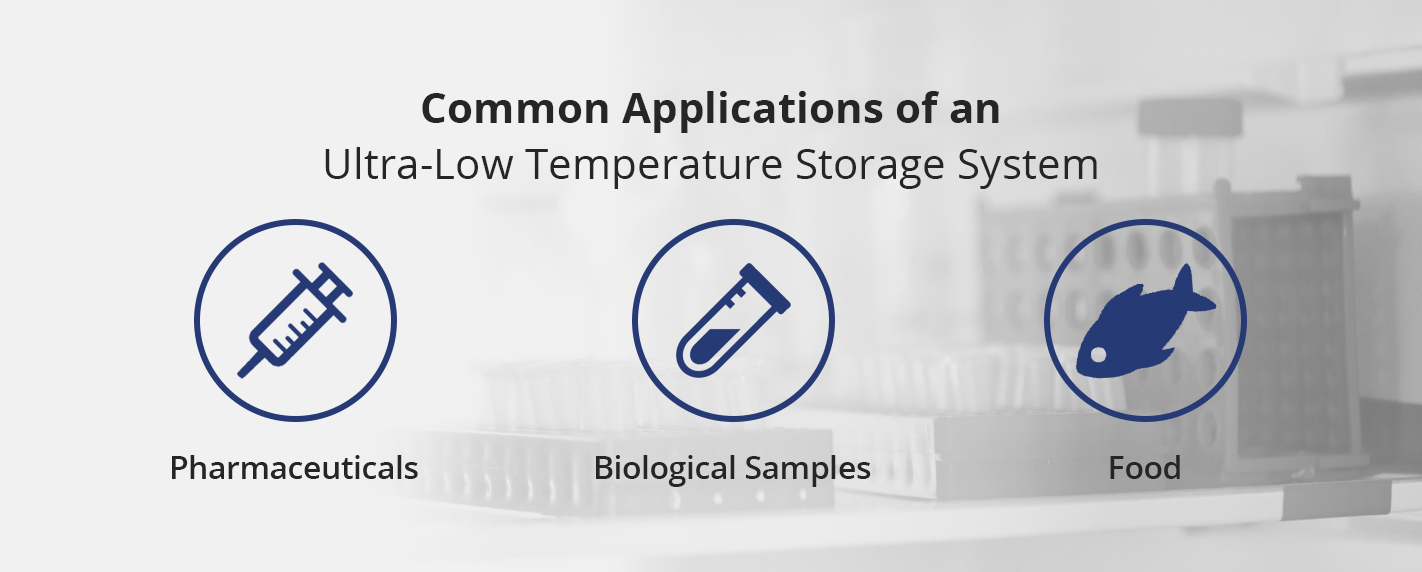
Ultra-low temperature freezers are designed to store materials that require constant freezing temperatures. Unlike typical kitchen freezers which should be kept at -18° C, an ultra-low temperature freezer provides precise temperature control to protect products from temperature fluctuations better. Ultra-low temperature freezers may be used in blood banks, hospitals, research institutes, pharmaceutical manufacturing facilities, cold storage facilities and food processing and packing plants. Retailers and supermarkets may use ultra-low temperature freezers to keep food products as fresh as possible. Here are some materials that require ultra-low temperature storage.
1. Pharmaceuticals
Some pharmaceutical products must be stored in ultra-low temperature freezers such as certain vaccines and antibiotics. For example, all varicella-containing vaccines should be stored between -50°C and -15°C, and kept continuously frozen until administration. Some vaccines like the measles-mumps-rubella (MMR) vaccine can be also be stored in freezers. Proper storage is crucial for pharmaceuticals because it ensures medicines are safe and effective. Improper storage can also lead to wasting expensive products and the high cost of revaccination.
For example, in 2017, 23,000 patients were given vaccines that were not properly stored in Ventura County. Over a thousand of the patients got revaccinated as a result. If all 23,000 people had gotten revaccinated, it would have cost $1.3 million.
2. Biological Samples
Ultra-low temperature freezers are essential for proper storage of biological samples such as blood and plasma. For example, plasma must be stored at less than or equal to -18ºC until it is thawed. Freezing preserves the blood and plasma and its critical components and keeps a steady supply of life-saving transfusions available.
3. Food
Products such as ice cream, frozen foods, meats and seafood require cold storage freezers to maintain safety levels. Food industry companies, from manufacturers to retailers, can use ultra-low temperature freezers to store foods such as fish, meats, fruits and vegetables to ensure freshness. Companies can freeze just about any food, except for canned foods and eggs in shells, to preserve the food.
According to the Department of Agriculture, food stored at -18°C will always be safe. Freezing temperatures cause microbes to enter a dormant stage and prevent the growth of microorganisms that cause foodborne illness. Parasites such as trichina can be destroyed by freezing foods at ultra-low temperatures. Also, storing foods at -18°C or lower will retain vitamins, color, flavor and texture.
Proper food storage is especially important in the food industry, where temperature issues could lead to spoilage and the growth of staphylococcus aureus, E. coli, Listeria monocytogenes and Salmonella. Despite this, temperature abuse still occurs. For example, in June of 2019, a large wholesale distribution center had to recall an undetermined amount of meat and poultry products due to temperature issues during transport. According to Food Safety Magazine, food recalls are not just a threat to public health, but they also damage brands. The average direct cost of a recall for a food company is $10 million. It’s always best to err on the side of caution when it comes to proper food handling and storage.
Frozen tuna can also be kept at temperatures -60°C or below in order to still maintain a sushi-grade rating. When the tuna has been blast frozen down to these temperatures storage and transport at -60°C can reduce costly airfreight and prolong shelf life without sacrificing taste.
Benefits of Ultra-Low Temperature Storage
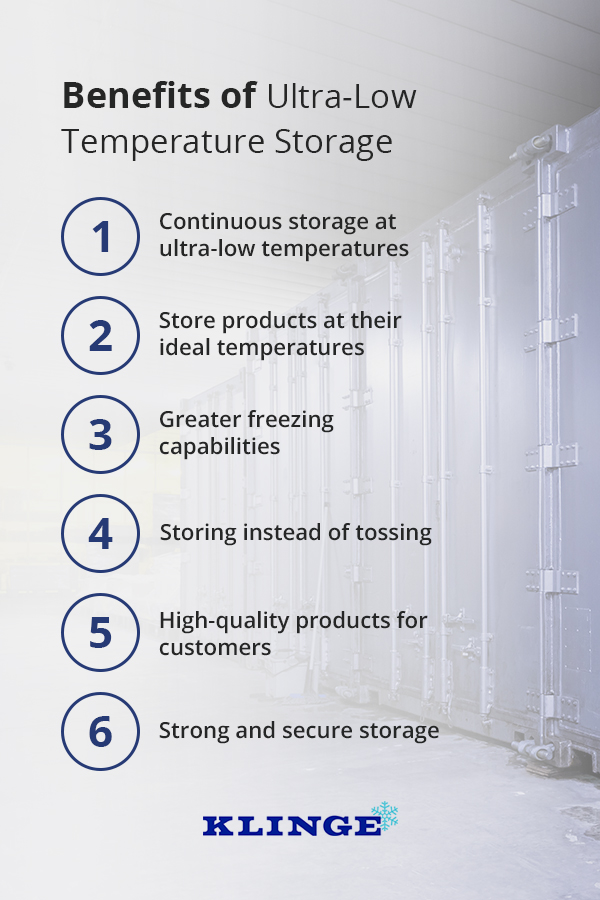
Ultra-low temperature freezer storage does more than the average cold room container. With superior freezer storage, cold chain companies can enjoy multiple benefits, such as:
- Continuous storage at ultra-low temperatures: With a reliable ultra-low temperature freezer container like the NMF-372, companies don’t have to worry about system failure. Our unit includes two independent freezer systems which act as backups to each other in case of failure, ensuring your cargo stays frozen and safe. Continuous frozen storage is critical for pharmaceutical products that could be lost at even the smallest temperature excursion.
- Store products at their ideal temperatures: Our quality ultra-low temperature storage unit takes the guesswork out of temperature control. With the easy-to-use interface and digital display, companies can store products at precise temperatures whenever they need extra space or a backup — no more worrying about food spoilage or ineffective vaccines.
- Greater freezing capabilities: An ultra-low temperature freezer container provides more space to freeze a greater amount of inventory — perfect for handling the busy season. Freezer units can also be strategically placed to increase efficiency and reduce worker steps.
- Storing instead of tossing: Do you have too much inventory? Is something not selling as fast as you anticipated? Instead of tossing a surplus of products, you can utilize extra freezer storage space to extend the shelf life of products.
- High-quality products for customers: Ultra-low temperatures preserve the quality and freshness of food. Customers appreciate food that looks and tastes as if it was taken from the sea or farm that day, and they’ll remember that high level of quality next time they order or shop for frozen foods.
- Strong and secure storage: Our freezers are built to last and fully protect products. We do not use wood in the construction of our units, which means our freezer storage containers are safe from rot or moisture damage.
Using an Ultra-Low Temperature Freezer for On-Site Storage
The Dual System Deep Freezer Container, Model NMF-372, is designed for both on-site storage and transport. This unit uses three-phase power to remain consistent and efficient.
Although you can use the NMF-372 freezer for long-voyage transportation of deep-frozen or frozen products, it also makes an excellent on-site storage solution. With features like auto function tests and fault diagnostics, troubleshooting is easy. Also, with the easy-to-use human-machine interface (HMI), it shouldn’t take long to show employees how to utilize the NMF-372 fully. There’s even a power supply for optional container lighting, making it convenient to use for storage day or night.
There are multiple reasons why cold chain management companies would use an ultra-low temperature freezer for on-site storage, such as needing:
1. Extra Floor Space
If your facility needs extra floor space, whether to change the layout, add new equipment or make room for new products, extra storage can save you the cost of adding floor space or expanding the cold storage room. Instead of expanding the building to accommodate current needs or sacrificing efficiency by crowding the area with equipment or products, you can store frozen products safely elsewhere on your property in a secure freezer unit.
2. Additional Space for a Production Uptick
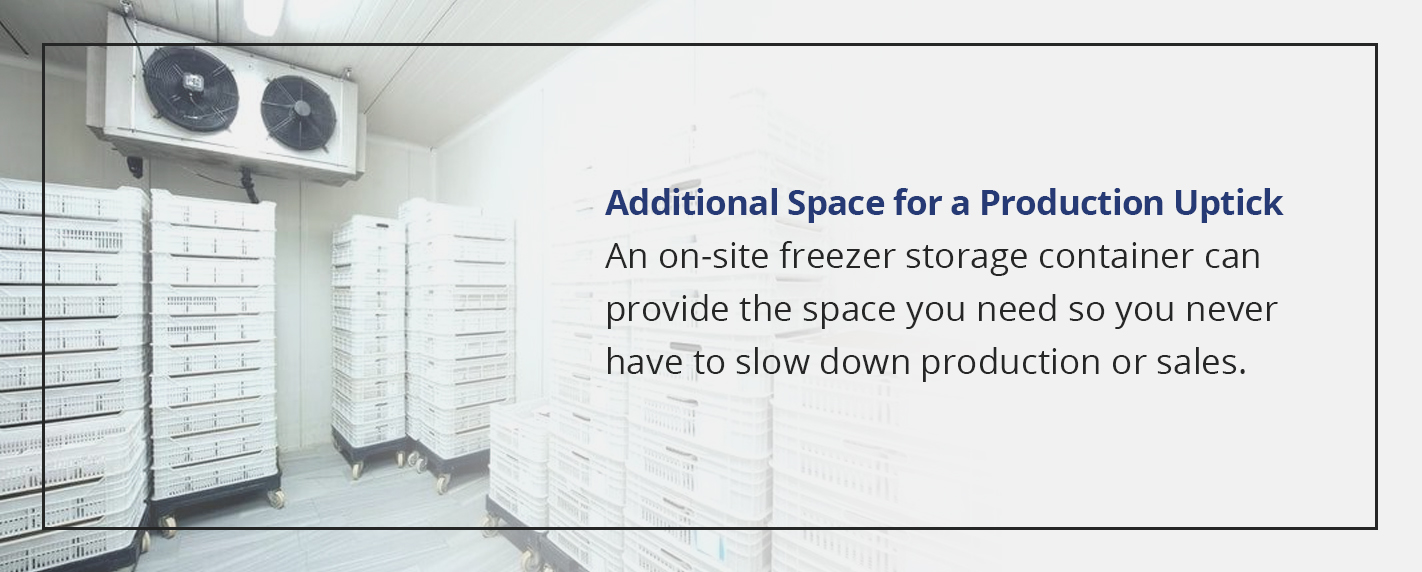
If you need additional freezer storage to meet rising consumer demand, an on-site freezer storage container can provide the space you need so you never have to slow down production or sales. Extra freezer storage is especially useful in food industries where production differs by season. For example, seafood processing peaks in the summer when tuna, salmon and Pacific whiting are more available. Navigating this peak requires very controlled processing and handling, and an on-site storage unit means companies can keep up with demand while keeping food safe.
3. A Cold Storage Zone in Between Transit Methods
You don’t want to disrupt the cold chain if you work in the food or pharmaceutical industry, as this could lead to devastating consequences for your business and your customers. An ultra-low temperature storage unit makes it easier to maintain required temperatures throughout every part of the process, including in between transit methods. From production to distribution, you can help keep products optimally frozen in an on-site storage unit as they wait to be shipped. As a result, you can worry less about food and pharmaceuticals sitting too long at the wrong temperatures and spend more time focusing on other aspects of your business.
4. Easy Access
Depending on the size of your facility and product needs, you may be able to use freezer containers as an on-site storage solution instead of relying on a third-party cold storage facility. With storage capabilities on-site, you’ll always have quick and easy access to your products, and you won’t need to run back and forth between your business and a storage facility. You can maximize efficiency when you have frozen products always at your disposal. Freezer storage units also offer great flexibility, as you can add more units as needed. On-site storage is an excellent solution for pharmaceutical companies because it’s recommended that vaccines are handled and transported as little as possible.
5. Extra Space for Product Experimentation
Are you testing out new product ideas and need extra freezer space for ingredients? A freezer storage container can give you the space you need as you develop new products and test your ideas, and you won’t have to toss other products to make room. With ever-changing consumer tastes, you don’t want anything, such as space limitations, to hold your company back. Extra storage space can be a part of your plan to help your business flourish.
Ultra-Low Temperature Storage Containers for Freezer Downtime or Repair
Another critical reason to have an NMF-372 on hand is to handle unplanned downtime or freezer repairs. Downtime is costly, and not something any food processing plant, cold storage facility or pharmaceutical company wants to face for long — or at all. For example, downtime in a food processing facility is estimated to cost as much as $20,000 to $30,000 an hour. If a freezer goes down and you don’t have a backup freezer to store your products, you could lose them. You’ll then have unfilled orders, lost customers and thousands of dollars of unusable products.
Likewise, some vaccines must be stored in a continuously frozen state from the manufacturer all the way to the patient and can deteriorate rapidly if the proper temperature is not maintained or if the vaccines are exposed to temperature fluctuations. According to an article published in African Health Sciences, factors such as poor handling and storage, cold chain deficiencies and power shortages are associated with millions of dollars of vaccine wastage. A backup storage freezer prevents temperature excursions and helps keep vaccine shipments safely on track.
Our freezers come with dual redundant options, meaning that even if one of the freezer units stops working, the other will pick up to ensure the temperature range remains constant. In the event of a power failure due to extreme weather or an unexpected condition, our ultra-low temperature storage system helps reduce the impact of downtime and preserves valuable cargo until things are up and running again.
Our storage containers are also useful if a standard freezer or cold room needs to be repaired. If a compressor stops working, for example, and you’re unable to keep products frozen, you’ll need a solution fast. A backup freezer container can prevent loss while you wait for a repair. You can also lease one of our containers and move your products into the unit while your freezer undergoes a scheduled repair.
Lastly, a freezer storage container can come in handy if you’re expanding or remodeling your building. You can prepare for the construction ahead of time and store inventory in the freezer unit so you can keep business running.
Contact Klinge Corporation Today
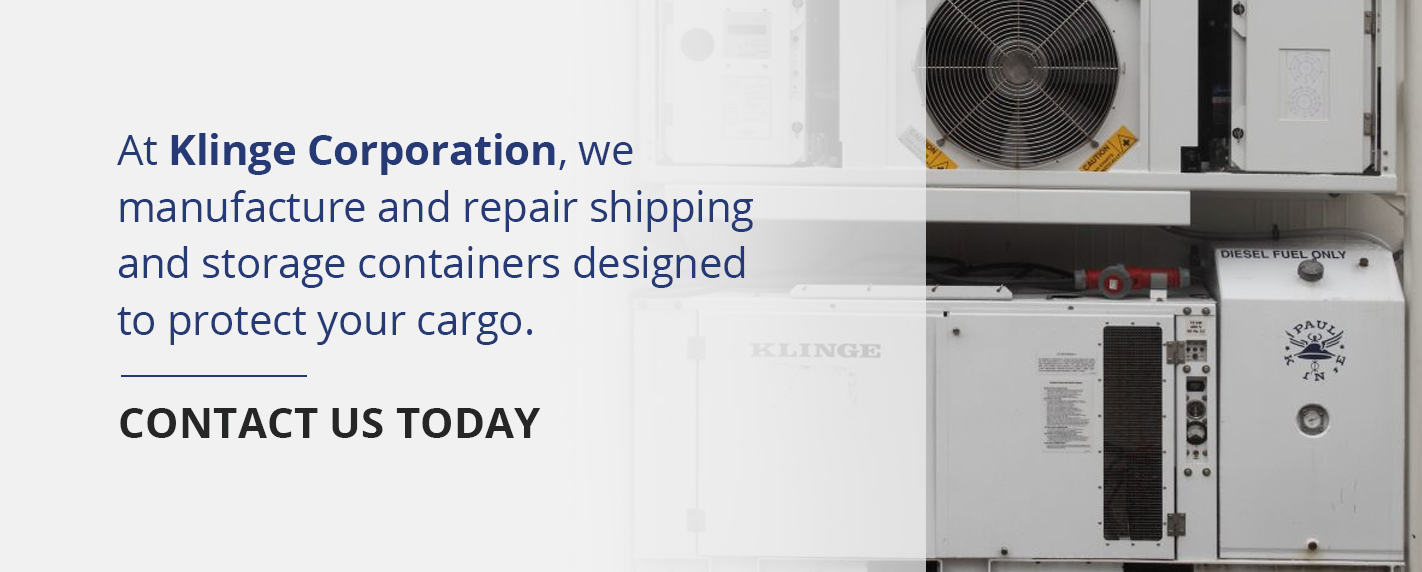
If you need an ultra-low temperature freezer for extra storage, you also need a freezer manufacturer you can trust. At Klinge Corporation, we manufacture and repair shipping and storage containers designed to protect your cargo. Whether you need a backup unit to prevent temperature excursions or extra storage space for your growing company, our reliable, easy-to-operate containers will keep your products at the optimal temperatures. To learn more about our deep freezer storage containers or other products, contact us today or request a quote.
